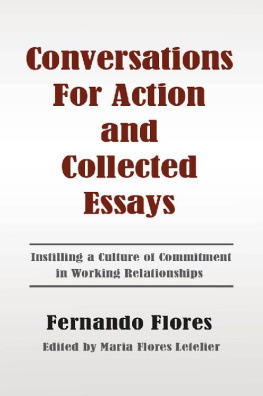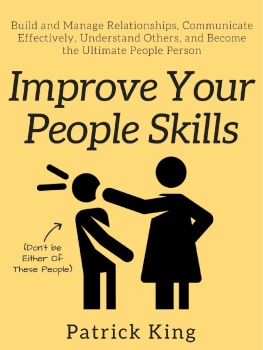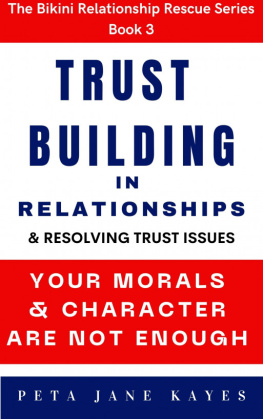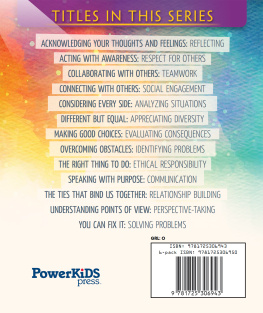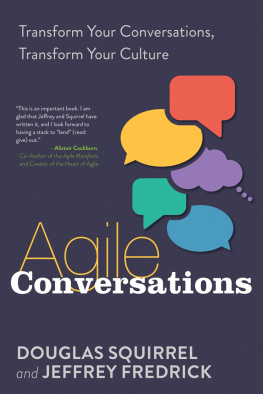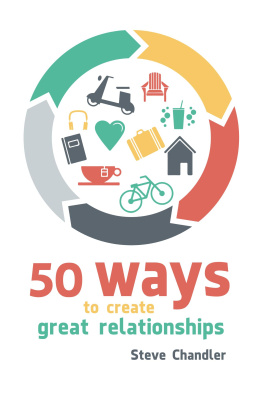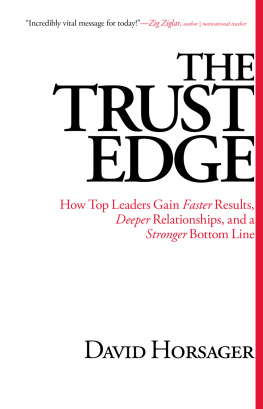
Copyright 2012
All rights reserved.
ISBN: 1478378484
ISBN 13: 9781478378488
eBook ISBN: 978-1-62346-134-8
Library of Congress Control Number: 2012914423
CreateSpace Independent Publishing Platform
North Charleston, South Carolina
For Gloria, wife, mother and inspiration
Table of Contents
At long last, here is a volume of the Fernando Flores original essays on his philosophy of communication, which has become so important in business. Bravo!
Many of these essays circulated in an underground of Fernandos students and business clients, but did not see the light of day or become available as a collection. Until now. Finally all those who asked for such a collection will be satisfied. Although written in the 1980s, there is a timelessness about the essays: they speak vividly to issues we encounter today.
I especially like the commentary by Fernando at the beginning. It gives a nice summary, in his own words, of the key ideas in his thought. It also explains the inspirations behind the ideas.
I also liked the introduction by Maria Flores Letelier, Fernandos daughter, who carefully edited all the pieces and, in her commentary, adds her own interpretations. She took time to say what makes each essay relevant today.
I started my career in the late 1960s as a computer scientist professor and was drawn to Fernando and his work in the mid 1980s because I was encountering management breakdowns in a research institute I was leading. From Fernandos essays I saw like a lightning bolt that my traditional view of information as a collection of facts, and of coordination as exchange of information, completely missed the side of language in which we make commitments, build our identities, and cope with our moods. That was where the management breakdowns were coming from. Once I learned this I was able to lead the organization much more effectively.
Fernando offered another interpretation growing out of this, that education is the learning of practices at increasing levels of skill. This was another lightning bolt that revealed that my approach to teaching was built on the idea that education was transferring information. I developed a manifesto about how engineering education could become vastly better if based on his new principle, and I took it back to the university where I could put it to practice. I developed a design course called Sense 21 (a new common sense for the 21st century), which became very popular. The students formed an alumni group that continued for ten years after the first time I offered the course. No student of my traditional computing classes wanted to form an alumni group. Fernandos principles were more appealing than many computing principles!
Over the years I became interested in how these principles could help leaders and entrepreneurs be more successful at innovation. This culminated in a book about innovation as a skillful practice for getting others to adopt new ideas into their communities. My second career as a teacher of innovation practices grew of those essays. Now Im a computer science professor who also teaches innovation
Take this book, settle into a comfortable chair, and let the new insights settle into your system. Soon you will be seeing lightning bolts too.
Peter J. Denning
Distinguished Professor of Computer Science
Co-Author of The Innovators Way (MIT Press, 2010).
The essays in this collection are drawn from papers that I wrote with a group of collaborators between 1985 and 2000. During those years, I led the development of enterprises in education (Logonet Inc.), business consulting (Business Design Associates Inc.), and software (Action Technologies, inventor of coordinator software). The essays in this collection were prepared for clients and for our own thinking for doing our work. Each essay, with the exception of Conversations for Action, was initiated with a question I was exploring in our work and challenges with clients. The reflections behind Conversations for Action date back to my term in the Allende government in Chile, where the question of communication for getting work done first came to me. I later developed the subject in my dissertation, Management and Communication in the Office of the Future, at the University of California, Berkeley.
At the core of all of the essays is my understanding of language as the fundamental characteristic of what makes us human. Language has many dimensions. We have words and sounds and writing. But language also has the dimension of actsthe way that we do things with language, and that language does with us. Our rationalistic tradition, in which I was educated originally as an engineer at the Universidad Catolica in Chile, puts its emphasis on facts, the representation of facts, building models, and communicating about the truth of claims. Through life experiences, some of them tougher than others, and profound study of philosophy, I gained the conviction that there is a whole other world that is just as important, and no less rationala world that is emotional, social, and historical. This is the world in which, in collaboration with others, we bring forth realities, negotiate with each other, and make history happen, all in conversations with each other. It is a world in which language is not merely about notations of facts but also poetical and political invention.
Many of the essays in this collection were constructed in an attempt to bring this other world to people in a way that would empower them to invent a new capacity and facility of readiness to participate in this dimension of our worldto pursue new observations and new skillsand at the same to do that in practical ways, avoiding the hysteria that sometimes pervades philosophical ventures into new worlds of possibility.
I have benefited a lot from the speech act tradition developed by Professor John L. Austin at Oxford, and by Professor John Searle, with whom I did my PhD at the University of California in Berkeley. I have brought what I learned from them and from the tradition to reinterpret the world of business and relationships in a different wayan ontological way. Another dimension of language into which I have delved is its hermeneutical dimension: listening and learning to be receptive to our inheritance from traditions are central issues. In my learning, the towering figures in that tradition have been Martin Heidegger and Hans Gadamer. Personally, my chief teacher has been Professor Hubert Dreyfus at the University of California at Berkeley. In the background of all of this, though often not explicitly, has been my interest in our biological being, particularly in the tradition built by Professors Humberto Maturana and Francisco Varela, fellow Chileans and colleagues for many years.
It was during this same period, 1985-2000, that I wrote and published Understanding Computers and Cognition with Terry Winograd, Building Trust In Business, Relationships, and Politics with Bob Solomon, and Disclosing New Worlds with Charles Spinosa and Hubert Dreyfus.
Despite the fact that the papers that follow carry my signature, they all result from collaborations and carry the contributions of many people. The more remarkable contributions to this body of work have been Chauncey Bell, Michael Graves, Charles Spinosa, Alfred (Bud) Vieira, and my daughter Maria Flores Letelier, with whom I discussed, framed, drafted, and built the papers.
When we started doing this work, computers and networks were just coming along. (I first drafted Understanding Computers and Cognition on a Xerox Alto computer, which was one of Steve Jobs inspirations in designing the early Apple computers.) Providing interpretations and tools for the world that we could see was coming was one of the inspirations and motivations for all of the work since.
Next page
